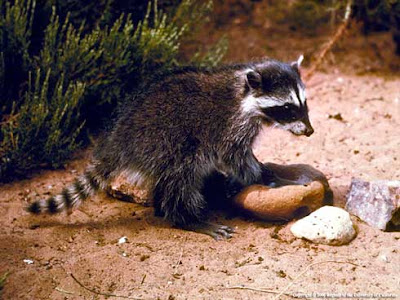
Free workshop -- available via Zoom or in person -- offered by Placer County master gardeners

|
|
A vertebrate pest, such as this young raccoon,
can be a gardener's nemesis. (Photo by L. Fitzhugh,
courtesy UC Integrated Pest Management)
|
Ever wonder what’s eating your plants? How can you tell rat damage from raccoon foraging? And who’s digging all those holes?
Find out during a free workshop hosted by the UC Cooperative Extension Master Gardeners of Placer County.
Set for 10:30 a.m. Saturday, May 14, “Guess Who’s Coming to Dinner – An Integrated Strategy for the Management of Vertebrate Pests” will tackle the pesky problem of identifying hungry and destructive critters.
The one-hour program will be offered via Zoom as well as in person at Loomis Library, 6050 Library Drive, Loomis.
“You will learn various methods to protect your garden from vertebrate pest damage,” say the organizers. “We will review the effectiveness of different methods and teach you how to minimize harm to the environment, other critters and your family. Some of the pests we will cover include squirrels, gophers, moles, voles, rabbits, raccoons and skunks.”
Learn effective ways to outsmart voracious varmints and save your garden – without the use of poisons or harmful chemicals.
No advance registration is necessary, although pre-registration for the Zoom presentation is encouraged. Find full details and Zoom links at: https://pcmg.ucanr.org/?calitem=527828&g=123640 .
Comments
0 comments have been posted.Sacramento Digs Gardening to your inbox.
Sites We Like
Garden Checklist for week of July 21
Your garden needs you!
* Keep your vegetable garden watered, mulched and weeded. Water before 8 a.m. to reduce the chance of fungal infection and to conserve moisture.
* Feed vegetable plants bone meal, rock phosphate or other fertilizers high in phosphate to stimulate more blooms and fruiting. (But wait until daily high temperatures drop out of the 100s.)
* Don’t let tomatoes wilt or dry out completely. Give tomatoes a deep watering two to three times a week.
* Harvest vegetables promptly to encourage plants to produce more. Squash especially tends to grow rapidly in hot weather. Keep an eye on zucchini.
* Pinch back chrysanthemums for bushy plants and more flowers in September.
* Remove spent flowers from roses, daylilies and other bloomers as they finish flowering.
* Pinch off blooms from basil so the plant will grow more leaves.
* Cut back lavender after flowering to promote a second bloom.
* It's not too late to add a splash of color. Plant petunias, snapdragons, zinnias and marigolds.
* From seed, plant corn, pumpkins, radishes, winter squash and sunflowers.